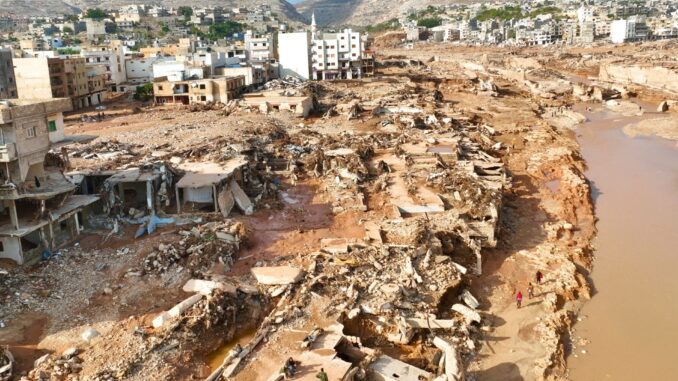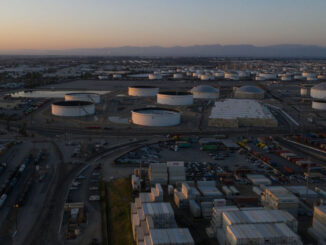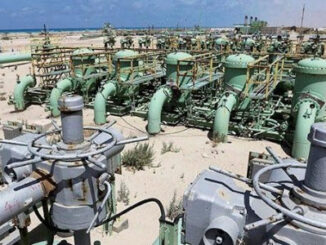
As Storm Daniel pounded Libya, the people of Derna were primed for a flood. But then two neglected, ageing dams gave way upriver and more than a million cubic metres of water bombed through the city, obliterating entire neighbourhoods.
Libyans desperately sought information. People outside the stricken areas were worried about their families in Derna and its environs; people in Derna didn’t know what to do, where to go.
But local media failed to deliver, information from authorities was confused and foreign media could not get there fast enough.
Mohammed Elgrj, a correspondent for Libya’s Ahrar TV channel, was angry at the situation and, along with his wife and fellow journalist Zainab Jibril, began to share information they were able to gather from survivors, witnesses and officials.
Choking access
Libya’s feuding administrations – the internationally-recognised government in Tripoli in the west and another in Benghazi the east – seemed to come together at the beginning of the tragedy as Tripoli sent aid convoys and both vowed to cooperate.
Journalists and media crews rushed to report on the thousands killed and displaced, but there was more than one level of challenges.
Physical access was hampered by roads that had collapsed, split wide open, or drowned in mud. Journalists also had to contend with red tape that has some foreign crews still trying to get in and official interference in coverage, reportedly from the eastern administration.
Jamal Alkomaty, a Benghazi-based Libyan influencer, reportedly went missing on September 14 while commuting between Sousa and al-Wardia in the devastated area, publishing videos of the devastation to his 226,000 Facebook followers, and receiving thousands of reactions.
According to his brother, he was taken by security forces and his family has not been able to find him since. Al Jazeera could not independently verify this.
According to a Libyan journalist who spoke to Al Jazeera on condition of anonymity for fear of retaliation, some channels told their reporters what to say.
The rivalry between the two governments “has confiscated my right as a journalist to convey our suffering and hold to account those responsible for where we are now”, the journalist said.
Riehan Rostom, a 35-year-old bureaucrat in Benghazi, said coverage was politically driven.
“Each outlet reported the catastrophe from its own perspective, focusing on what served the interests of those behind it. Without objective media on the ground, we couldn’t know what is happening,” Rostom said.
The anonymous Libyan journalist agreed: “Media wasn’t up to speed from the start. The coverage was weak, untimely and irresponsible. No one warned us.”
Even those who tried to relay accurate information were not able to find it. It was three whole days after the disaster that Elgrj criticised the absence of officials communicating with arriving international rescue teams.
“There is no unified relief collection point or even organised points coordinating with each other. Most of the efforts are conducted by a group of volunteers, civil society, and individuals from the Red Crescent,” he posted on X.
Journalists taking the lead
Elgrj and Jibril couldn’t stand for the yawning vacuum in information, so they started their own efforts, tweeting everything they could find, in spite of their own losses. Jibril had suffered a miscarriage brought on by the stress levels, and they were both worried about her family members in Derna.
“All that I could think of was: ‘This was the worst disaster in Libya’s history and we need international support.’ But information was scarce. There were no communications, electricity, medicines, and no one knew what’s happening,” Elgrj told Al Jazeera.
He launched the Media Channel WhatsApp group, starting by adding ministers from both governments, along with every official he had on his phone from his 10 years in journalism.
“My first message in the group was: ‘I apologise. I know there is a deep political dispute and war between you for years, and there has been no communication between you, but circumstances no longer allow this. Efforts must be united. Please do not leave the group. I will be the neutral party and let us save our people and tell the world what is happening’. They all responded. The stalemate broke,” Elgrj said.
The group founders added feeds from witnesses, activists, and journalists on the ground, and started adding local and international media. By Sunday, it had 535 members and more initiatives had popped up to help visiting journalists figure out how to get in and move around.
The Live Reports Page regularly updated the numbers of missing and deceased people, as well as donations that had been gathered and items that were still urgently needed.
“We collect all these numbers from credible sources, verify them and visualise them in a dynamic and easy-to-update platform accessible to international media and global rescue missions,” said data analyst Mohamed Ziad, who co-founded the page with five other volunteers.
“The government is putting pressure not to share them, and international media is pressuring to have them,” he added.
Another initiative by data analyst and media specialist Nour Momen, Mafqood (Missing), compiles the names of the missing.
“I saw people who were asking about their loved ones on social media. I created a simple form to record missing persons. This is a database of all those people who are registered missing by their relatives,” she explained, adding that she is working closely with the Ministry for the Families of Martyrs and the Missing, the Red Crescent, forensics experts, and other volunteers on the ground and outside Libya.
Tariq Elmeri, a London-based filmmaker, said he started Wiki Libya Hurricane Daniel “within 24 hours, as soon as I noticed there was a lot of information that got scattered in posts and tweets”. His team compiles information like emergency numbers, news and human stories.
On September 15, for the first time ever, Libyan TV channels of all different political affiliations carried a joint broadcast to collect donations.
“There is a huge media solidarity,” Elgrj said about the broadcast on his group.
“It’s reminiscent of the 2011 revolution’s days. Back then we all cared for each other and TV and radio stations supported each other. The difference is the pain. Today the dominant emotion and motive is pain, while during the revolution it was enthusiasm for the cause,” Hendia Alashephy, a Benghazi-based journalist, told Al Jazeera.
Shortly after the start of the 2011 revolution against longtime dictator Muammar Gaddafi, radio and TV stations and newspapers united to support the rebellion, focusing on countering his narrative and providing updates on what was happening.
“What we see today in Libya resembles the time of 2011, but with popular solidarity from various political orientations towards one goal: to save the afflicted!” Elgrj tweeted on Saturday.
This story has been published in collaboration with Egab.
With local media failing to deliver information, independent Libyan reporters cover the dam disaster on their own.
ENB Top News
ENB
Energy Dashboard
ENB Podcast
ENB Substack



